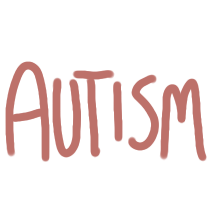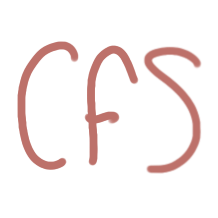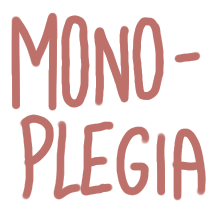#monoplegia
Explore tagged Tumblr posts
Text
A few disability wordmojis!










Autism, asthma, heart disease, CFS(ME), TBI (traumatic brain injury), diplegia, hemiplegia, monoplegia, paraplegia, quadriplegia.
Hope these look okay.
#custom emoji#disabled#chronically ill#cute emoji#discord emojis#emotes#disability emoji#disabled emoji#autism#asthma#heart disease#cfs/me#tbi#traumatic brain injury#diplegia#hemiplegia#monoplegia#paraplegia#quadriplegia
101 notes
·
View notes
Text
chai headcannon: chai suffers from monoplegia ,witch explains why his arm doesn't function properly.this could happened from a spine injury from when he was really little. or of course he could been born with monoplegia.
4 notes
·
View notes
Note
Hi! I have a character with monoplegia who loses use of their left leg after an accident, and I was wondering what kind of recovery tools/mobility aids would be most beneficial. One of the plot point also has them go to an Equine Therapy of sorts after as well, so if you know anything about horseback riding for disabled people or any resources, that'd also be great
Hey!
Monoplegia, as all -plegias, is a very diverse disability and there's definitely no one “correct” way to go about writing it. There are monoplegics who don't use any aids, and there are monoplegics who are full-time wheelchair users.
So typically, crutches would probably work for most people who are in otherwise good physical condition (no big problems with shoulders or wrists, etc.), but it wouldn't be unrealistic if they preferred a wheelchair or maybe even a cane; the latter mostly if their leg is spastic rather than floppy. If they do walk, a leg brace (AFO or KAFO) would probably be very helpful.
As for recovery, various kinds of therapy would be great to include. Physical therapy that focuses on rebuilding (or maintaining) strength, improving (or maintaining) flexibility, improving (or maintaining) control over muscles, working on preventing falling and improving balance, etc. A lot of this is done with very similar exercises as the ones that able-bodied people do for the same reasons, so things like stretching or swimming would probably be helpful. Other tools would be of course pain medication, as well as muscle relaxants if they experience spasticity and/or spasms.
Generally, monoplegia is the second rarest kind of -plegia (after triplegia) and there definitely isn't a ton of resources for it. What you might find helpful is looking for rehabilitation info around hemiplegia, and simply omitting the exercises that are there to help with the upper limb.
I could swear that I have personally answered an ask about horse riding while disabled on this very blog, but I've been unable to find it, unfortunately. This article from physiopedia is I think a helpful introduction to the topic, especially with the list of differences between hippotherapy and therapeutic horse riding (from what you're describing, I'm assuming you're looking for the former). You can of course also look for accessibility aids for regular riding, but it's a completely different beast than horse therapy.
I hope this helps,
mod Sasza
27 notes
·
View notes
Text
Did y'all know that the "paralysis of the lower half of your body, including both legs, is called paraplegia"?
Why do I know this?
No reason
6 notes
·
View notes
Text
character concept part 1

#he doesnt even have a name yet#but by god does this bad boi can hold SO MUCH TRAUMA#he has monoplegia and can't move his leg very well so he uses walking stick for mobility#also this interpretation doesn't represent even 1% of his actual nature#i also can't decide if I want to give him a secret sword in his walking stick or if I want him to use his stick as a magical staff
2 notes
·
View notes
Text
when people look at some wheelchair user who can move legs / stand / walk / ambulatory / etc, n they respond with “not all wheelchair user paralyzed,” then if do “educational” post, often go on explain how don’t have (traumatic) spinal cord injury / SCI
often with attitude “paralysis / SCI (to them same thing) so well known well understood accommodated accepted visible”
which. in isolation, “not all wheelchair user paralyzed” & “not all wheelchair user have (traumatic) SCI” objectively true.
but it’s like. the utter confidence in their complete ignorance of paralysis and SCI, & ignorance of their ignorance, conflating paralysis always = SCI, & that both always mean cannot move leg at all. all while treating paralysis & SCI as this most understood disability / wheelchair using reason they a victim of.
as in like. if someone give you shit about be in wheelchair but move leg & you want educate. tell them some wheelchair user can move leg. not “not all wheelchair user paralyzed” because some people paralyzed can also move leg. saying latter only show your ignorance about paralysis, while throw ppl w paralysis under bus
don’t have any kind paralysis so maybe worst person make this post but
did you know SCI & paralysis not the same. did you know can have leg paralysis without traumatic SCI through some sort physical injury. multiple sclerosis, ALS, FND, tumor, paraneoplastic syndrome, cerebral palsy etc can all cause paralysis. n many more
did you know paralysis can be monoplegia (one limb), paraplegia (both legs), diplegia (same area both side of body), hemiplegia (one side of body), & quadriplegia (all limbs). as in, yes, some people may have paralysis but still can move legs because at least one leg not affected.
n
did you know (depending on how categorize) there two types of spinal cord injury. complete & incomplete. people w incomplete SCI, brain can still send some signals below SCI site & so have some feeling and/or function.
did you know some people w SCI can move legs, including involuntary spasms (tho sometimes can be on purpose triggered by doing certain things if learn trigger).
did you know some w incomplete SCI can voluntarily move legs. can walk with mobility aids. can walk without mobility aids. can be ambulatory wheelchair user. some use their spasm to stand. n they still considered have (incomplete) SCI & paralysis.
if you didn’t know these then maybe SCI & paralysis not as well understood well accepted disorder as you think & treat it as.
(also did you know, can be non ambulatory wheelchair user without have paralysis. suprise)
(tried double triple confirm facts, but, people w paralysis, if say anything wrong please do kindly correct. cognitive + language communication disability often mix up things)
687 notes
·
View notes
Text
Lula issues Christmas pardon but not for sex or antidemocratic offenders

Brazilian President Luiz Inácio Lula da Silva issued a pardon favoring terminally ill prison inmates as well as at-risk pregnant women or those with HIV but fell short of benefitting those who committed crimes that were either heinous - such as torture, terrorism, racism, money laundering, concealment of assets - or against democracy, it was announced Monday in a special edition of the Diário Oficial da Uniao (Official Gazette).
The pardon also covers inmates “with paraplegia, tetraplegia, monoplegia, hemiplegia, ostomy, amputation, paralysis, blindness or other physical disability that causes similar impairment, proven by a report issued by an official doctor,” the document mentioned. The measure also includes prisoners with severe autistic spectrum disorder or neurodiverse conditions or inmates suffering from a serious, chronic, highly contagious illness, or who are blind.
Continue reading.
#brazil#brazilian politics#politics#luiz inacio lula da silva#prison system#image description in alt#mod nise da silveira
8 notes
·
View notes
Note
Never got to share some of my headcanons for the hfr characters but here we go:
Chai is a blind mf (near-sighted) and needs glasses. Like, right now.
I don’t really know what glasses to give him though. Maybe like John Johanas has. Those could probably suit him.
Korsica is sporty, without a doubt, all about that daily exercise and healthy nutritious diet. What sport would she do though? I think boxing, like with Macaron, would probably suit her, yet I’d also think of kickboxing and maybe some jogging on the side.
On that note, Chai seems extremely flexible, almost if not outright gymnast levels. It remains a mystery for how long Chai had his right arm the way it was before the implant. Maybe he had it like that since he was a baby, but I can imagine him somehow injuring it in his early years, and it was just so severe that he couldn’t get its fine motor skills back. Like, maybe Chai has a degenerative disease that either runs in the family or only affected him due to him being a gymnast.
Or he’s just that naturally flexible and jumpy idk
Another headcanon for Korsica (me fine woman) is that she actually used to play drums and it’s not just a motive that she has in the game with her batons. Maybe she was part of the school orchestra and would only play simple tunes in there, while actually being good enough to pop off any minute. I instantly remember that video “When you’re overqualified for the job” when I think about it.
If the groups were to start a band, then Macaron would def be a piano guy and Peppermint the bass girly.
OKAY i'm gonna go down the headcanon list ting bc i love your takes and i want to respond to all of them properly TEE HEE
would NEVER have thought chai to be blind or in need of glasses tbh, though i'm here for it!! i personally think he would've been more far sighted bc of his ability to snatch onto magnets and grab enemies and stuff... (the thought of him squinting the entire game and hitting any moving robot looking blobs in his field of vision is pretty funny though tbh LOL) ... also i looked up john johanas and it's been a hot minute since i've booted up the game but i SWEAR the ones with the thick black frames are an actual pair of glasses you can get in the shop for chai and i am SOOO doodling that if i have the time
korsica is absolutely sporty. proof: sporty fit in shop. also she's head of security she literally HAS to stay in shape to spin that thang around. (also idk if it's just me but it's implied her batons are pretty heavy bc there's this one specific scene during her boss fight when the game is like "okay scratch parrying everything!" where she strains JUST a little bit to get into the spinning motion so she is SOOOOO absolutely muscular). ALSO did not think about korsica and macaron sparring!! macaron doesn't seem like the type to spar at his age LOL... but maybe he'd be up for it occasionally post game :0!!
i definitely think he would've tried to stay limber growing up all things considered, he has WAYYY too much stamina if he can beat up all those robots LOL but now that you mention it, he DID practically fold in half at the very end of the first stage... BUT i personally hc he has monoplegia as a result of an accident when he was really young as opposed to something he was born with. i'm by no means a medical expert, but it sounds... medically inaccurate for a degenerative muscle disease to stay in one arm? (if you ask me tho, i think he would have a brachial plexus birth injury IF he were to be born with it, but again) take that with a fistful of salt, i'm not a doctor and i don't know shit
i don't have much to say for the last two, i agree with you for the most part BWAHGAHGW i love the idea that if someone asked korsica about why she chose the weapons she chose, she'd just say something like "hitting drums, hitting people. same difference." and shrug BWAHWBJAHGSHJF
#ask#answer#text post#hi fi rush#hi-fi rush#hi fi rush chai#hi fi rush korsica#hi fi rush macaron#headcanons#AHRGSKHRGSRAJHR i love hi fi rush ask me more things#i love yapping
15 notes
·
View notes
Text
Terry posting:
All of his teachers hate his ass because he's over here skipping school to work on a farm. He shows up on Fridays to take 4 tests(immediately skips swimming to avoid Leighton) before maybe refilling his year-long textbook deposit and heading back out into the countryside.
Terry is *thriving* in Rapechester, mans has several thousand dollars at any given time and he mostly uses it at the farm because he doesn't talk to anyone outside of Alex(his lover), Bailey(the shithead who charges him rent), Remy(to insult her), and Sydney(to refill his ridiculously long book deposit so that he can pass his tests).
He has mild cerebral palsy(monoplegia in his left leg) and uses a crutch. He's also intersex with ovotestes and ambiguous genitalia(just like me fr fr)

He also refuses to go anywhere without a rainhat and rainboots because he spends so much time outside.
4 notes
·
View notes
Text
i’ll probably never outright say it in the comic but fun fact :johnny has monoplegia and eli has macular degeneration (specifically charles bonnet syndrome) and also a lot of vampires are stuck in a one stage or another of heart disease idk if it’ll ever be super relevant bc immortality but yeah
7 notes
·
View notes
Text
25th of march is cerebral palsy awareness day!


[ID: What is.. Cerebral Palsy?
Cerebral Palsy affects about 1 in every 400 children born in the UK. There are three main types:
Spastic: 75-90%. Spasticity tightens and contracts a person's muscles. This can make movement difficult.
Ataxic APX 5%. Ataxia causes difficult with balance, co-ordination and spacial awarness. It can also affect speech and language.
Dyskinetic APX 5-20%. Dyskinetic CP makes it difficult to control limbs and muscles. It may affect speach and language.
Cerebral Palsy affects different parts of the body. There are four diagrams: one with the left arm shaded in reads: “Monoplegia is One limb, usually an arm”. The diagram with the left half of the body shaded in reads: “Hemiplegia is One side of the body; legs arms and torso”. The diagram with all of the body except the head shaded in reads: “Quadripligia is All four limbs”. The diagram with just the legs shaded in reads: “Dipligia is Symmetrical parts of the body; legs or arms”.
No two people experience Cerebral Palsy in the same way. People can experience difficulties with different things: Breathing, movement, posture, balance, pain, eating, sight, hearing.
The infograph is attributed to CP Sport (Cerebral Palsy Sport). On facebook and twitter as: @/cp_sport. And on the website: www.cpsport.org.
Second image text reads: 10 Things I didn’t know about cerebral palsy (until I had a kid with cerebral palsy).
1. Cerebral palsy isn't so rare.
2. It's caused by brain damage.
3. There are different kinds.
4. There are varying degrees
5. It messes with muscles big & small
6. It can make you tight or loose.
7. It can be different every day.
8. There is no cure.
9. It doesn't disable your personality.
10. You shouldn't feel bad for people with cerebral palsy. /End ID]
4 notes
·
View notes
Text
you guys have NO idea what ive been doing to chai lately. spectra bullshit, more spectra bullshit, vigorous digging sounds as i look up monoplegia and congenital heart defects, tinkering with chai/kale concepts and making them both horrifically fucked up (dubious consent considering spectra as a background anyone?) and very, very soft (or what about their wedding and honeymoon, hm? is that more your fancy?), holding a magnifying glass up to his scarred heart that fears touch because its always meant pain. hes so inch resting to me. so silly so dumb so oddly deep yet shallow. my beloved dumbass
7 notes
·
View notes
Text
"Mom , will you wash my back this once ?"
Aubrey Abril oc intro

Aubrey is 15 years old , has auOCD , and has monoplegia[the paralysis of a singular limb] ! She also likes cookies , baking , and going to war ! She is a mother to her adoptive son , Benjamin , and is German ! She speaks fluent German and semi-fluent English ! Here is her and her flags !

#oc artist#my ocs#oc tag#original character#digital art#my art#drawing#artists on tumblr#original writing#creative writing#writing
2 notes
·
View notes
Note
Hello! I hope you having a good day, I just had a question that I hope is ok.
Is there any condition that would make it difficult to walk long distances (sometimes using a wheel chair, sometimes crutches) but doesn't affect the hands/arms at all? I'm working on a concept for a character and was wondering about making him an ambulatory wheelchair user since it's not something I see often in stories, but he's also a musician mainly playing stringed instruments and I don't want that to become painful for him.
But I wasn't sure if that was something that could exist and I wouldn't want to write it that way if it's not
Hello lovely asker!
So here is a list of conditions that don't (or sometimes don't) affect the upper body and can be ambulatory conditions.
Conditions that physically effect the lower back/legs:
Lower extremity amputation
Congenital lower body differences - Foot, ankle, knee etc. (Club Foot, Miserable malalignment syndrome etc.)
Sacral Agenesis
Monoplegia
Leg injuries
Cartilage Damage/Injuries
Spina Bifida
Arthritis
Incomplete Paraplegia
Leg length difference
Ankylosing Spondylitis
Multiple Sclerosis
Hypermobility
Hereditary Spastic Paraplegia
Posterior tibial tendon dysfunction
Complex regional pain syndrome
Conversion disorder
Brain Based Disorders:
Epilepsy (drop epilepsy, myoclonic epilepsy etc)
Diplegic Cerebral Palsy
Narcolepsy (often with cataplexy)
Chiari malformation
FND
PANDAS
Tourettes/tic disorders
Autoimmune Encephalitis
Heart/Respiratory/other etc.:
Vertigo/POTS/other conditions that cause syncope/dizziness
Respiratory Conditions (COPD, etc)
Heart Conditions
Conditions that affect balance/increase fall risk
Post polio (and other diseases)
Psychosomatic Paralysis/Pain/other ailments
This is just a rough list of what we could all come up with, there are many others that have gone forgotten, but that's for you the writer to do more research on too. One thing is a few of these conditions can affect the hands or eventually progress to effecting the hands, arms, and/or even the upper or lower back.
Depending on what type of instrument they play will also factor in. Playing posture is different with every instrument, as well as the weight. And some instruments like the Viola Da gamba does require leg strength. If the character is classically trained also, it makes a difference in etiquette. I am (was technically) classically trained and if you have pain of any kind you're told it doesn't matter, you're told to play through the pain and keep going. To suffer for your art is still the prevalence in the classical world. Excruciating pain? Keep going. Cut open your finger on something? Keep going. It's not good, but it is the reality of it, unfortunately.
Also I will mention that don't be afraid to choose another condition that does affect the character's upper body. A lot of disabled musicians have a variety of conditions and simply exist and play music. But also even though the character might have a condition that mainly affects the legs, if pain is common with the condition you choose, this still will affect the character playing. Being in pain even if it's not in your arms or back can be very distracting and will throw you off.
And one last thing! Please don't write this character "Overcoming" their disability to play music. I would research disabled musicians (Itzhak Perlman is the first one that comes to mind for me) and even—if called for—adaptive technology for instruments or how people have adapted their instruments/music to them for more accessibility.
Alrighty! Happy writing! I hope this helps some!
~ Mod Virus 🌸 (and a very thank you to Mods Sasza, Rot, Bert, & Patch for helping me with the research on this)
84 notes
·
View notes
Text
HOMOEOPATHY FOR PARALYSIS
Paralysis is the loss of muscle function in part or all of the body. It results from a disruption in communication between the brain and muscles, often due to neurological damage or trauma.
Types of Paralysis
1. Monoplegia: Affects one limb.
2. Hemiplegia: Affects one side of the body.
3. Paraplegia: Affects both legs and sometimes the lower abdomen.
4. Quadriplegia: Affects all four limbs and the torso.
Common Causes
1. Neurological Issues: Stroke, multiple sclerosis, or cerebral palsy.
2. Injury or Trauma: Spinal cord or brain injury.
3. Infections: Polio or Guillain-Barré syndrome.
4. Other Factors: Tumors, toxins, or metabolic disorders.
Symptoms
• Loss of muscle movement.
• Numbness or tingling in the affected area.
• Muscle stiffness or spasms.
• Difficulty speaking or swallowing in severe cases.
Homeopathic Medicines for Paralysis
1. Causticum
• Best for paralysis following a stroke, especially facial paralysis or hemiplegia.
• Muscles feel weak and stiff; difficulty swallowing.
• Aggravation in dry weather, improvement in damp weather.
2. Plumbum Metallicum
• Effective for progressive paralysis with muscle wasting and trembling.
• Common in cases associated with lead poisoning or brain lesions.
3. Gelsemium
• Indicated for paralysis due to exhaustion, emotional shock, or viral infections.
• Symptoms include heaviness, numbness, and trembling of limbs.
4. Lathyrus Sativus
• Useful in paralysis of lower limbs, particularly post-polio or paraplegia.
• Stiffness and difficulty walking are prominent symptoms.
5. Hypericum Perforatum
• Ideal for paralysis resulting from nerve injury or spinal trauma.
• Relieves associated shooting pains.
6. Phosphorus
• For paralysis with tingling sensations, numbness, and exhaustion.
• Useful in post-stroke recovery to enhance energy and motor functions.
7. Arnica Montana
• Suitable for paralysis caused by physical trauma or stroke.
• Relieves bruised sensations and promotes nerve healing.
8. Zincum Metallicum
• Effective for spinal cord-related paralysis with twitching and restlessness.
Dietary Recommendations
1. Include:
• Omega-3 fatty acids (fish, flaxseeds), leafy greens, and whole grains for nerve health.
• Protein-rich foods to support muscle recovery.
2. Avoid:
• Processed foods, excessive salt, and alcohol.
3. Stay Hydrated:
• Drink sufficient water daily.
Lifestyle Support
• Engage in regular physiotherapy to maintain mobility.
• Use assistive devices like braces or walking aids if needed.
• Manage stress through relaxation techniques like meditation or yoga.
Note
Homeopathic treatment should be individualized based on the patient’s symptoms and constitution. It is crucial to consult a qualified practitioner for appropriate remedies and dosages. In acute cases, such as stroke, emergency medical care must not be delayed.
0 notes
Text
Hidden Truths: Discovering Myself
I don’t have many medical records, but the ones I do hold are invaluable. This is my journey — not an easy one to recount, but a journey I’ve had to undertake nonetheless. It’s a path I was forced to walk after discovering that my disabilities had been hidden from me. While this account may be unsettling to those who read it, including those close to me. It’s a journey I’ve chosen to share, because by doing so, I hope to find closure for what has been a profoundly challenging and painful chapter in my life.
The 'Story'
I was under the care of 'The United Teaching Hospital' for many years, with more than one specialist in attendance. I only have a few letters in my possession. Mr. J.M.P. Clark, an orthopaedic surgeon, initially provided insight into my condition, which I later learned was cerebral palsy, having initially been diagnosed at the age of 2 – with me finding out at the age of 46. I also have medical letters in my possession from Mr I Forsythe, a consultant paediatrician, in which he describes me as a 'left spastic monoplegia.' I also had Dr Martin A. Nelson, another consultant paediatrician in attendance, who was brought in to help with a foot-drop, noted by Mr. J.M.P. Clark.
My Further Medical Notes
In one of my medical letters from Mr. I. Forsythe, he noted I was bottom of the class, and when questioned, my father put that down to a memory problem. On the consultant questioning there didn’t seem to be any evidence of a perception problem. Throughout my schooling my father ignored my learning difficulties, and chose not follow through.
It wasn’t clear in my medical notes, why I was diagnosed with monoplegia and hemiplegia by two different consultant paediatricians. In my medical notes from Mr. I. Forsythe, he noted I was bottom of the class, and when he questioned my father, my father put that down to a memory problem. On the consultant questioning there didn’t seem to be any evidence of a perception problem. In the conversation that followed, the consultant asked my father to keep an eye on my learning, so they could keep an eye on my learning, citing a potential retardation in that consultation. My father ignored it and chose not follow through.
Throughout my visits as a child to hospital, there was more than one diagnosis, with one consultant paediatrician describing me as a monoplegia, likely because the symptoms were mild and less apparent at the time. There was no reference in my notes as to why I was also diagnosed as a hemiplegia.
Dr Oliver Lilly
Following a consultation with Dr. Oliver Lilly, a few decades later on my insistence at the age of 46, when I went through yet more testing to find out about what was wrong with me, a neuro-physiotherapist was brought in to evaluate me physically – who pointed out after physically examining me, (although it wasn't clear in some of my medical notes, noting that I had been diagnosed with both monoplegia and hemiplegia. In my medical notes from Mr. I. Forsythe, he noted I was bottom of the class, and when questioned, my father put down to a memory problem. On the consultant questioning there didn't seem to be any evidence of a perception problem. Throughout my schooling my father ignored my learning difficulties and chose not follow through with this particular paediatric consultant, who had concerns on my learning.
Throughout my visits as a child to hospital, there was more than one diagnosis, with one consultant paediatrician describing me as a monoplegia, likely because the symptoms were mild and less apparent at the time. There was no reference into my notes as to why I was diagnosed as a hemiplegia.
Precis/excerpt from one of my letters from Mr J.M.P. Clark dated 16th January, 1965
"This child’s parents have noticed that she limps with her left leg and that her progress has been slower than that of her twin. The child was born prematurely by five weeks and started her life in an incubator. She drags her left leg and her leg reflexes are slow. Her left leg tendon is tight. I can detect no clinical abnormalities but I suspect that the condition is a monoplegia, caused by cerebral palsy. I recommend the child should be kept under observation and enrolled in the pre-school clinic so that we can decide how much mental retardation there will be and how this will impact on the child’s education. Regular physiotherapy will help the walking. It may be necessary on some future date to lengthen the tendon." - Mr J. M. P. Clark
Discovering Myself
"When I was diagnosed with cerebral palsy at the age of 46 and autism at the age of 56 respectively, my world tilted on its axis. For years, I had wondered why my movements were awkward or why I felt out of sync with others. It wasn't something ever spoken about. When the neurologist explained my condition at the age of 2, I wasn't aware of the condition. My father attended all my consultancy appointments with me. The specialist didn't speak to me, he spoke over me. So, at the age of 46, it was a mix of shock, betrayal and profound sadness that overwhelmed me. How could something fundamental to my identity have been hidden from me? As a child I was consumed by anger and was constantly getting into trouble for it. I thought back to the times when I stumbled during lessons, didn't get learning or school, struggled with sports, and also struggled also with fine motor tasks as a child. My parents' insistence that I was “clumsy” and that whatever I didn't manage in school, was just 'me' was a deliberate cover-up from the truth. It hurts deeply to know they had actively made the decision to keep it from me, assuming ignorance would shield me from their embarrassment, their pain, other people's opinions, judgments, misjudgments and stigma. I've had it all. Instead, that ignorance left me feeling alienated from myself for decades. As I began to process my diagnosis, my emotions shifted slightly. Learning about cerebral palsy brought me an unexpected mix of grief and relief. Everything felt lighter, but then reality struck. The diagnosis validated all my struggles, providing the clarity I needed, but still didn't understand and needed to work on. It would take me another decade to understand the finer details.
I haven't been able to grieve for the years I had lost – years where I could have understood myself better, years where I might have had the empathy, sympathy and understanding. Instead I was faced with a barrage of abuse on what I later learned was a disability by being kept in the dark. My entire life has been shaped by a lie. It still is because nothing has been resolved and with no apologies. While I am starting to come to terms with it, it’s not easy. It's something I will never get over because it spanned too many years. Instead, I’m learning to re-frame my experiences and reclaim my story, but the weight of what was hidden still lingers."
I don't take ownership of any of this: it is not mine to own: I am simply passing it along.
For more inspirational and lifestyle blogs, please check out my site https://www.thecpdiary.com
#thecpdiary#blog#Hidden#Truths#Discovering#Myself#Mentalhealth#personal journey#healthandwellbeing#healing#self worth#self growth#mindfulness#mindset#growth mindset#empowerment#personal development
0 notes